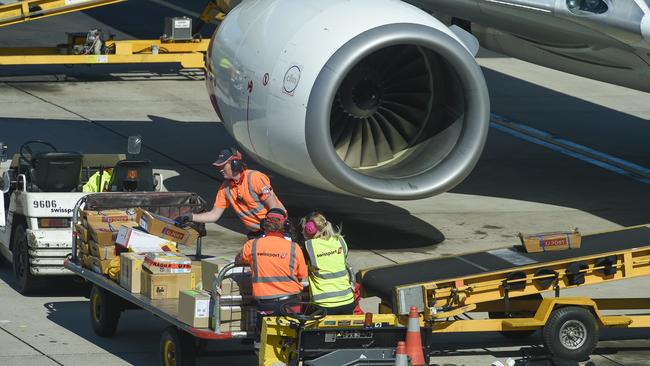Qantas takes jobs outsourcing battle to High Court
The airline has ripped apart a ruling by the Full Federal Court in its application to appeal the decision on outsourcing in the High Court.

Qantas has filed an application to the High Court for leave to appeal a decision that found the airline acted unlawfully when it outsourced the jobs of almost 2000 ground handling workers.
The decision in late-2020 came as the Covid crisis unfolded, with Qantas insisting the move to use third-party contractors for below wing services was entirely motivated by the need to save money.
The Transport Workers Union claimed Qantas was using the pandemic as an excuse to enact a long-term plan to rid the airline of a highly unionised segment of the workforce.
In July 2021, Federal Court judge Michael Lee found in favour of the TWU, ruling that Qantas had failed to prove it was not motivated by a desire to avoid industrial action by the workers in question.
Qantas appealed but the Full Federal Court upheld Justice Lee’s decision in a unanimous ruling on May 3.
In response, Qantas vowed to take the matter to the High Court in an effort to reverse the decision and avoid a big financial penalty.
Its application for special leave to appeal the ruling, lodged just minutes before the window for such an action expired, argued the Full Court erred by concluding the Fair Work Act extended to “future workplace rights”.
The application said the Full Court had made assumptions about section 340 of the act, that was not supported by the legislation.
“Had parliament intended to expand the protection afforded by sections 340 and 341 and include future rights within the concept of workplace rights, it would have stated that expressly,” said Qantas’s application to the High Court.
“Indeed if the Full Court’s construction is correct, it extends the protections of the Fair Work Act into an area where its predecessors had never reached, and without any suggestion in the extrinsic material of any such legislative intent.”
On the issue of why special leave should be granted by the High Court, Qantas said the Full Court’s construction had “significantly altered the balance between employers and employees in the operation of the Fair Work Act”.
“The application is of general public importance given the large number of employees directly affected by the proceedings and the clear implication for other employers/employees facing like situations,” said the document.
The TWU slammed what it called Qantas’s “costly attempt to drag out workers’ suffering by filing an eleventh hour application” to the High Court.
“Enough is enough,” said TWU national secretary Michael Kaine.
“Qantas should drop its appeal, accept its wrongdoing and begin the work of earning back Australia’s trust by fairly compensating workers for the jobs they unlawfully stole from them.”
The application for special leave came as global research firm UBS published a detailed note on Qantas’s recovery from the Covid-19 pandemic.
Senior analyst Andre Fromyhr said “post-Covid looked better than pre-Covid” for the airline due to the stripping out of costs, an improved domestic competitive landscape and the reset of the international network.
Although the fuel price had risen sharply, Mr Fromyhr noted Qantas’s hedging program would help limit the damage to its $1bn cost transformation target.
And far from being threatened by the relaunch of Virgin Australia, the expansion of Rex and the imminent entry of Bonza into the market, Mr Fromyhr said domestic competition was “one of the most attractive things about the outlook for Qantas post-recovery”.
“Compared with our prior expectations, Qantas has performed better on corporate, although fares are taking longer than we had expected to return to new normal levels,” he wrote.
“The prospect of Bonza entering and Rex scaling up has the potential to undermine the benefits of Tiger exiting, however we believe it’s too early to say they will have a material impact on Qantas profitability.”




To join the conversation, please log in. Don't have an account? Register
Join the conversation, you are commenting as Logout